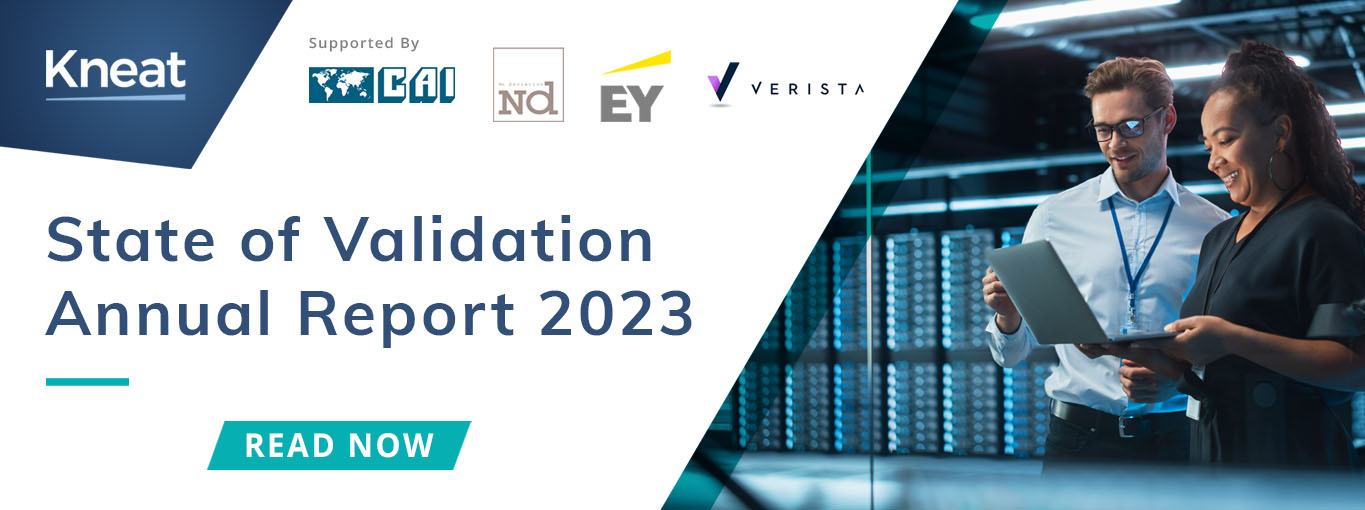Section One of the State of Validation 2023 report, People and Organizations, analyzes the key demographics of the survey respondents, including organization size, compensation, and challenges related to their roles. In this article we’ll explore some of the report’s key demographic insights. Download your copy of the full report to uncover more validation trends, challenges, and opportunities and see how your organization’s validation program measures up.
Validation professionals are the unsung heroes of the pharmaceutical, biotechnology, and medical device industries. They bear the critical responsibility of ensuring that the products we rely on for our health and well-being meet stringent quality and safety standards. Behind the scenes, these dedicated individuals are driven by a sense of purpose. State of Validation 2023 survey respondents signaled that the most rewarding aspect of their roles is “Protecting Patient Safety Through Quality Assurance.”
Yet the validation landscape is not without its challenges. The volume of work placed on validation teams continues increasing year-over-year. In the 2022 survey, 81% of respondents reported an increase in validation workload over the previous year. In 2023, this number saw a slight dip to 69%, with 71% predicting that workloads will continue to escalate in 2024. This evolving trend reflects the pace of industry evolution, driven by technological advancements and shifting regulatory demands.

n = 153
Over the past 12 months, how has your validation workload changed? Please select one.
However, validation teams aren’t necessarily expanding to match the surge in workload, even within larger organizations. Surprisingly, 31% of companies indicated that their validation teams contain fewer than three staff members. This raises questions about how validation professionals are managing their burgeoning responsibilities and whether organizations are providing the necessary support.
Amidst this backdrop, the 2023 survey data also sheds light on the most challenging aspect of being a validation professional: “Data Integrity.” Managing, securing, and verifying data in highly regulated industries can be incredibly demanding. In an era where data is the lifeblood of quality assurance and regulatory compliance, the need for effective data integrity management is paramount.

n = 153
In your opinion, what are the most challenging aspects of being a validation professional? Please rank all answer choices in order of preference.
One striking trend is the changing tenure patterns among validation professionals. The 2023 data highlights that the most common job tenure is fewer than five years in a position, with a significant 63% of respondents falling into this category. However, it also points to a certain degree of turnover, as a majority of validation professionals surveys have between six and 15 years of total validation experience. This speaks to the depth of expertise and knowledge that validation professionals possess, and also a growing difficulty in retaining this expertise. We explore what motivates validation professionals in the report.
What can be done?
So, what lies ahead for validation professionals? How can organizations better support their dedicated teams and foster career growth? Here are a few key considerations:
1. Invest in continuous learning
Given the rapid evolution of technology and regulatory requirements, organizations should prioritize continuous learning and professional development for their validation teams. Equipped with the latest knowledge and skills, professionals can navigate challenges more effectively.
2. Resource allocation
To address the increased workload, organizations should carefully assess resource allocation. If workloads are consistently on the rise, it might be time to consider expanding validation teams, investing in digital validation technology, or outsourcing specific tasks to specialized partners.
3. Data integrity culture
Building a culture of data integrity is paramount. This includes robust data integrity management practices, regular training, and a commitment to upholding data quality standards at all levels of the organization.
4. Mentoring and knowledge transfer
Given the changing job tenures, organizations should implement mentoring programs to facilitate the transfer of knowledge and expertise from seasoned professionals to newcomers. This ensures a smooth transition of skills and experience.
Final thoughts
Validation in 2023 is marked by both rewarding facets and significant challenges. Validation professionals continue to be driven by their commitment to patient safety and quality assurance. However, as workloads increase and data integrity management becomes paramount, organizations must adapt to provide the necessary support and resources. By investing in learning and digital validation technology, and fostering a culture of data integrity, the validation field can continue to thrive and protect patient safety for years to come.

State of validation 2023
Industry expert Jonathan Kay has detailed the findings from the State of Validation survey in the most comprehensive validation industry report ever, State of Validation 2023. Take a deep dive into the data to discover more emerging trends, shared challenges, and how industry leaders are responding.
Powered by Kneat and sponsored by the report’s supporting organizations CAI, EY, No deviation, and Verista, the State of Validation 2023 provides an in-depth look at all facets facing validation teams. The report contains five key sections:
• People & Organizations
• Validation Programs
• Goals & Growth
• Industry Change & Digital Transformation
• The Future of Validation
See what’s changed from last year, what’s expected in 2024, and what others are doing to prepare.




